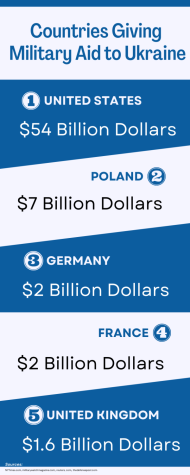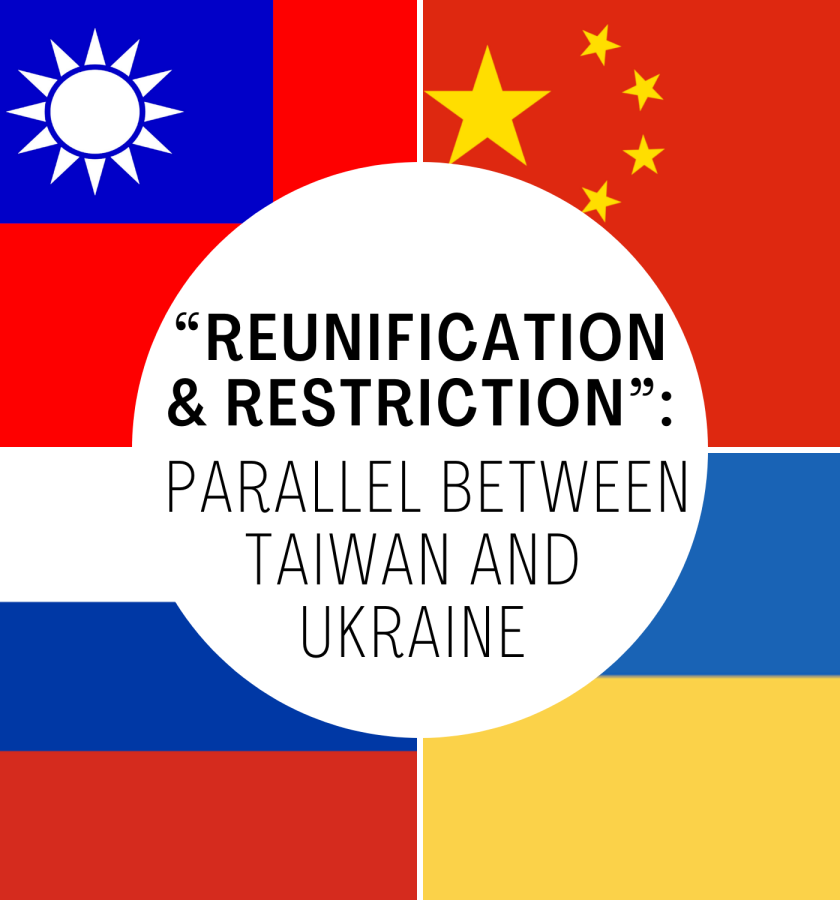“Reunification and Restriction”: Parallel between Taiwan and Ukraine
As the biggest war in Europe ever since World War Two unravels before our eyes between Russia and Ukraine, a similar conflict brews in the background between China and Taiwan for reunification (Arlina Yang).
June 1, 2022
Russia’s invasion of Ukraine ever since February has drawn a sharp similarity to the brewing tension for reunification between China and Taiwan that also began months ago with increased military activity in Taiwan’s air defense zone. While the battle for reunification between China and Taiwan has yet to ignite like Russia’s ongoing invasion of Ukraine, it might only be a matter of time.
Sanctions have been put on Russia from multiple countries due to the unwarranted war, as countries have united to provide Ukraine with aid, cripple Russia’s economy, and help Ukrainian refugees. Just as some countries pledged to do for Taiwan in a similar scenario. Now, the United States is sending hundreds of millions of dollars in aid to Ukraine, Japan is debating on defending Taiwan, and China is learning from the invasion day by day.
Look into the Present: Taiwan and Ukraine
Putin, Russia’s president, originally aimed to “demilitarize and de-Nazify” Ukraine through this war in an effort to stop the said bullying of the Ukrainians by their own government. The reasoning was founded on Russia’s controversial claim of Nazi influence and genocide from the Ukraine government.
The objective of the Russo-Ukrainian war: to take down Ukraine and its government, to end Ukraine’s desire to join Nato (the Western defense alliance), and to limit Ukraine’s combating abilities. Yet the predominant goal came to be the overtaking of Ukraine’s eastern regions of Luhansk and Donetsk after a month into Russia’s failure to seize Kyiv (Ukraine’s capital).
Russia has since conquered one third of the eastern regions through proxy forces ever since 2014 when Russia annexed Crimea from Ukraine in the Russo-Ukrainian War. Following the War in Donbas that lasted from 2014 to the present between Ukraine and Russia with a mixture of naval incidents and political tensions, the Russian military build-up on the Russia-Ukraine border in late 2021 was the trigger to Russia’s full launch invasion on Ukraine.
It is now a goal of Russia to now conquer all of the eastern regions. Russia has already laid claim to the southern region of Kherson as they aimed to seize the two big eastern regions and to create a land corridor along the south coast.
At the end of April, peace talks for neutrality between Ukraine and Russia discussed decreased military activity around Ukraine, change in status for Crimea, and most importantly—Ukraine’s association with NATO.
As Russia broke their own promises of peace including the Budapest Memorandum on Security Assurances 1994 and Russian–Ukrainian Friendship Treaty 1997 through the renewing of the Russo-Ukrainian war in 2022, world powers outside of the conflict are likely to be involved to ensure the enforcement of a compromise made between Russia and Ukraine. And the same could go for Taiwan.
While China, the People’s Republic of China, stands as one of the world’s biggest one party governing systems, Taiwan, otherwise known as the Republic of China, holds a two party system. China believes Taiwan to be a part of them under the One China policy, a principle that there is only one sovereign state as Mainland China with Taiwan as a part of China.
“I don’t think China will invade Taiwan, because from a Chinese perspective, Taiwan is part of the country, it will be meaningless to attack part of our own country. And also, the big military gap between Taiwan and the mainland has proved the impossibility, except for the US or other western force intervention,” said Sharon Jiang (‘23), a Chinese student who came to the U.S. in 2019.
Many overlook the fact that Taiwan has two political parties: Kuomintang (KMT) and Democratic Progressive Party (DPP), where the parties are actually divided in their respective ideals towards China. The KMT, the Pan-Blue Coalition, favors a close relationship or unification with mainland China. The DPP, the Pan-Green Coalition, is leaning towards Taiwanese nationalism and independence from China. Tsai Ing-Wen, President of Taiwan, is a Pan-Green Coalition party member.
In an effort to avoid a declared war on Taiwan, the island that China declares to be a part of the Mainland, China proposed a “one country, two systems” constitutional principle that allows for separate economic and administrative systems for the Mainland and Taiwan respectively. A proposal that Taiwan had rejected.
“It would help Taiwan to avoid the war between the Mainland and itself, because it also helps both sides to gain more economic opportunities when collaborating. Though a disadvantage would be that Taiwan would need to give up their freedom when unifying themselves with China, since China has an autocracy form of government,” said Jocelyn Hsu (‘24), a Taiwanese student who came to the U.S. in 2017.
On October 1st, heightened military activity of 150 Chinese military flights were reported to be seen in Taiwan’s air defense zone and 25 Chinese warplanes were additionally dispatched off the southern end of Taiwan to display China’s military prowess. Taiwan is regarded as a breakaway province of China as Xi Jinping, President of China, reiterated in his speech on October 9th that restated China’s determination to reunite Taiwan.
Both were once on the brink of war last year, but Russia and Ukraine had gone into war this February as China and Taiwan’s conflict stood at a halt during the biggest war in Europe ever since World War Two.
Taiwan and Ukraine: Similarities and differences in History
It was once both peaceful between Russia and Ukraine along with China and Taiwan.
Ukraine had become an independent state in 1991 with the dissolution of the Soviet Union, and through the expansion of the European Union (EU) in 2004, Ukraine became involved with both the EU and the Russian Federation.
The involvement surfaced a divide between Eastern and Western Ukraine to be pro-Russian and pro-European, a conflict that erupted the Russo-Ukrainian War starting with the Orange Revolution in 2004, protests in Kyiv against the 2004 Ukrainian presidential election that was claimed to be thwarted by the authorities.
Taiwan, also known as Formosa, was originally settled by the Chinese in the early 17 centuries, yet the first Sino-Japanese War in 1895 led to a change as the Qing relinquished Taiwan and Penghu (an archipelago of 90 islands and islets in the Taiwan Strait) to the Empire of Japan. It was after WW2 that China began to govern Taiwan in 1945 through Japan’s surrender.
“I think if other western forces get involved, it will not be a Chinese internal affair anymore, instead it will develop to be a continuity of fighting for dominance between great powers,” said Jiang.
Taiwan had become independent from China through the Chinese Civil War when the KMT lost control of mainland China in the Chinese Civil War in 1949 and retreated to Taiwan where Chiang Kai-shek ruled Taiwan as a single-party until calls for democracy in the 1980s that led to the first presidential election in 1996.
It has always been a mixture of peace and conflict between China and Taiwan depending on the leading political party in Taiwan due to the difference in the respective parties’ beliefs. Since there were decades of peaceful separation between the two as the debate of sovereignty was put in the background in meetings between Beijing and Taiwan authorities.
“Regardless of the political parties and all, I don’t want there to be war between China and Taiwan, it’s not beneficial for a strait that’s only recognized by 14 countries to go against one of the biggest world powers. Having a better relationship with the mainland, instead of pushing for Taiwan independence that might result in casualties and effects on either side, might just be better in order to maintain the present separate systems,” said Andrea Yang (‘23), a Taiwanese student who came to the U.S. in 2019.
Both Russia and China had exercised control over what was once a part of them, Ukraine and Taiwan in history. Though Taiwan and Ukraine hold similarities in history, a war for control can be mirrored between both China and Russia despite the different reasons for battle: reunification and restriction.
Now, the past is threatening to repeat itself in the present through the contrasting degrees of increased military offense on either side for the two pairs.
United States and Japan in the Grand Scheme
The U.S. had placed themselves in the middle of the battle for Ukraine and pledged the same for Taiwan in an effort to protect democratic powers in the world and to weaken the other world powers in the conflict.
In this Russo-Ukrainian War, the U.S. had officially spent $54 billion in aid packages, military assistance and firearms, and health services and food assistance to Ukrainian refugees. The cost is roughly double the amount of aid provided to Afghanistan in 2011.
“I don’t think America should get involved, I think it’s bad that they’re involved because we can see a bunch of other conflicts like Afghanistan, Vietnam, and everything. It did not turn out well,” said Anita Ratna Gautam (‘24), a Russian student who came to the U.S. in 2018.
Weaponry provided by the U.S. to Ukraine such as short-range air defense systems had been crucial to Ukraine’s defense of their capital, Kyiv, against Russia. Many allies of the U.S. have united in support of Ukraine to combat Russia’s ongoing aggression towards Ukraine ever since the seizure of Crimea in 2014.

Even though the U.S. has been providing Ukraine weapons for years ever since the start of the Russo-Ukrainian War, the number of supplied weapons have rapidly increased as Russia’s economy gradually spirals down as the Bank of Russia no longer has access to roughly half of their foreign currency reserves.
Despite China’s unwavering will to reunify Taiwan with the Mainland, the U.S. had pledged to do the same for Taiwan as they did for Ukraine to support them in the war.
“At least during Biden’s administration, I don’t think the US will explicitly help Taiwan against the mainland…The real intentions of the US behind the “aid” is wanting Taiwan to become part of their resource and power, which is the things that great powers always do, because resources are limited, competitions would always exist,” said Jiang.
In a series of friendly exchanges between the U.S. and Taiwan: the Taiwan Relations Act, Taiwan Travel Act of 2018, and Taiwan Allies International Protection and Enhancement Initiative (TAIPEI) Act of 2019, the U.S. demonstrated firm support for Taiwan. Nevertheless, the U.S. does not have a mutual defense treaty with Taiwan despite Taiwan Relations Act’s promise to provide U.S. arms for Taiwan’s self defense.
While the U.S. agreed to the One China policy in the Shanghai Communiqué of 1972, where they acknowledged Taiwan as a part of China. Through time, the U.S. had supplied around $23.7 billion in arms to Taiwan, and Joe Biden, the U.S. president, had decided that China’s use of force against Taiwan was improper as he verbally agreed to protect Taiwan in a war against mainland China.
“If Taiwan was to be taken by China…there’s no freedom. And China controls a lot of things…if reunification was to happen, the whole atmosphere [in Taiwan] would be different. But I guess if it [reunification] really did happen, Taiwan would just be another Hong Kong,” said Wei-Ting Yen (‘23), a Taiwanese student who came to the U.S. in 2017.
The U.S. had warned China about the military activity that threatened the peace in Taiwan, China continues to show no signs of backing down their military as their form of political pressure on Taiwan. In spite of Biden’s demonstration of aid for Taiwan, the U.S. remained generally ambiguous on their stance in face of battle between China and Taiwan.
Since Japan had previously exercised control over the island and feuded with China, there are speculations of Japan as an ally for Taiwan in addition to the U.S. to curb Chinese influence. Due to the U.S. demographics, there are concerns surrounding the reaction time would not be enough to be fast enough to respond to China’s attacks on the island.
Japan could be.
Furthermore, top Japanese officials had proposed Japan’s involvement with the U.S. in defending Taiwan and Japan’s threatened security if mainland China does attack the island. Other Western countries have also solidified their stance in the Russo-Ukrainian War to protect Ukraine in fear of encouraging China to react intrusively against Taiwan.
“I don’t think the essences of the Ukrainian Crisis and Taiwan issues are the same. Because from a Chinese perspective, Taiwan has always been part of China, and the reasons the issues remain is because of the different political ideas, and the intentions of those western forces to be able to have a voice and position in East Asia,” said Jiang.
China’s Plan following Russia
Russia’s attack against Ukraine had served as an example for China’s possible invasion of Taiwan. As Putin had overestimated their own military prowess and had failed to protect their economy, China could estimate the effects of an attack on Taiwan based on Russia’s repercussions from their invasion of Ukraine.
Even though China has not entered war since 1979, the Chinese military is predicted to perform better than the Russian military—which was going under corruption, substandard firearms, and more—going into an invasion as they have the world’s largest active military of two million.
“In the Chinese mainstream, the mass seems to criticize Putin’s policy on Ukraine. So I don’t think China will do the same thing to Taiwan as what Russia has done to Ukraine,” said Jiang.
While China holds a larger and more diverse economy than Russia, China is vulnerable to sanctions (punishments enforced by other countries) due to their expansive foreign trade network. Just as Russia took damage to their economy due to the freeze of almost half the country’s foreign currency reserves, China would be no exception. Neither China and Russia would be able to move forward on an invasion unscathed due to sanctions and foreign reserves.
“I think it wasn’t wise for Russia [to start a war], because if you look at what’s happening to the actual people of the country, it is bad, we cannot live,” said Gautam.
Russia has not only paid in damages to their economy and human lives, they paid heavily in their international reputation through this unprovoked war against Ukraine. China now has to consider and learn from Russia’s mistakes in this war as they reevaluate the possible consequences to their economy, sanctions against their financial system, and number of casualties.
Same goes for Taiwan, as they will equally learn from Ukraine’s strategies in resisting Russia’s attacks.
As of 5/26/22, peace talks between Russia and Ukraine are still in the works as Moscow, Russia’s capital, is demanding the acknowledgement of Crimea as Russian territory and recognition of Russian-backed parts of eastern Ukraine as independent states. Ukraine disagrees with some of Russia’s claims, but peace is still on the table.
China will likely pursue the Taiwan strait when they’re sure of a quick victory to avoid other countries’ intervention or sanctions effects like Russia had. And whether reunification will be pressed on will also depend on the 2024 Taiwan presidential election for the ruling political party.
And through all the highlighted outcomes from Russia’s invasion upon Ukraine, a peace relationship between China and Taiwan could be reinstated as a better alternative to the distinct parallel of the Russo-Ukrainian war.









